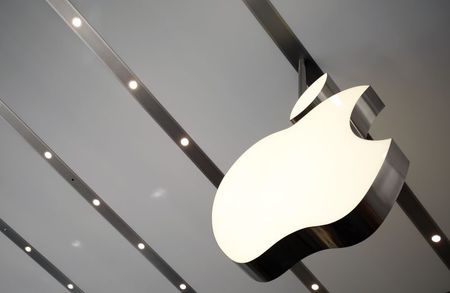By Maria Kiselyova
MOSCOW (Reuters) - Russia has proposed that Apple Inc and SAP hand the government access to their source code to make sure their widely used products are not tools for spying on state institutions.
The suggestion that two of the world's flagship technology companies disclose some of their most sensitive business secrets comes as the United States and Europe debate their most severe sanctions yet against Russia for its role in Ukraine.
On Tuesday, the United States imposed a new round of sanctions, hitting three Russian banks, including the country's second-biggest, VTB.
The European Union reached agreement on Tuesday on its first broad economic sanctions, marking a new phase in the biggest confrontation between Moscow and the West since the Cold War.
The Russian proposal was voiced last week when Communications Minister Nikolai Nikiforov met Apple's general manager in Russia, Peter Engrob Nielsen, and SAP's Russian managing director, Vyacheslav Orekhov, the Communications Ministry said in a statement.
It said the proposal was designed to ensure the rights of consumers and corporate users to the privacy of their personal data, as well as for state security interests.
While couched in the language of protecting privacy, any Russian move to force these companies to divulge the inner workings of their software could pose a major threat to their viability if they were to lose control of the source code.
"Edward Snowden's revelations in 2013 and U.S. intelligence services' public statements about the strengthening of surveillance of Russia in 2014 have raised a serious question of trust in foreign software and hardware," Nikiforov said in the statement released late on Tuesday.
He was referring to bombshell disclosures by the former U.S. National Security Agency contractor that revealed widespread NSA snooping through eavesdropping on popular technology products and services. Since then, experts have concluded that U.S. government-backed standards for software encryption have created backdoors for the NSA to spy on users.
Russia is not alone in challenging technology companies to come clean about their privacy practices.
Governments ranging from Germany to Brazil to China to India and dozens of other nations are revising technology practices in light of the NSA revelations – although most stop short of asking that technology companies disclose their source code.
THE CROWN JEWELS
A computer's source code is the underlying set of computer instructions that control the functioning of any software programme and translate it into machine-readable instructions for computers. Source code represents the crown jewels for any software maker and most major commercial software companies jealously guard the code as their most precious secrets.
"Obviously, companies which disclose the source code of their programmes are not hiding anything, but those who do not intend to establish cooperation with Russia on this issue may have undeclared capabilities in their products," Nikiforov said.
The ministry cited its more than decade-long cooperation with Microsoft. The U.S. firm has been sharing its source code for the Windows operating system and other products since 2003 with Atlas, a technology institution that reports to the communications ministry.
The ministry said the prospect of state companies using software and hardware when the producers do not share their source code with the government "remains uncertain".
SAP and Apple both declined any immediate comment.
The business models that have grown up around source code fall into two basic camps: Proprietary and open-source. Proprietary software makers strictly copyright their source code to prevent rivals from copying its hidden features. An increasing popular alternative is open source software whose developers provide open access to their source code and encourage collaborators to make modifications and improvements.
Typically, open source software makers charge customers for services and other products rather than for the software itself but must of the world's biggest tech companies resist doing so.
Apple, the world's most valuable company by market capitalisation, is best known for its distinctive range of computer and phone devices, which it seeks to distinguish through its closely-guarded proprietary software.

SAP, the world's fourth largest maker of business software, by revenue, and Germany's largest technology company, makes business planning software that many top multinational companies use to maintain financial control of their far-flung operations. It too keeps close guard over the source code of its products.
(Additional reporting by Eric Auchard in Vienna; editing by David Clarke)
2_800x533_L_1412520354.jpg)